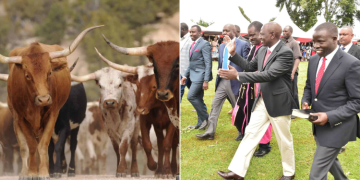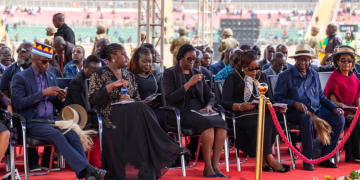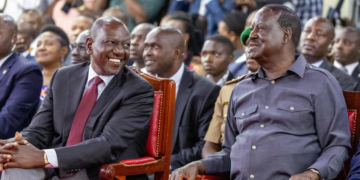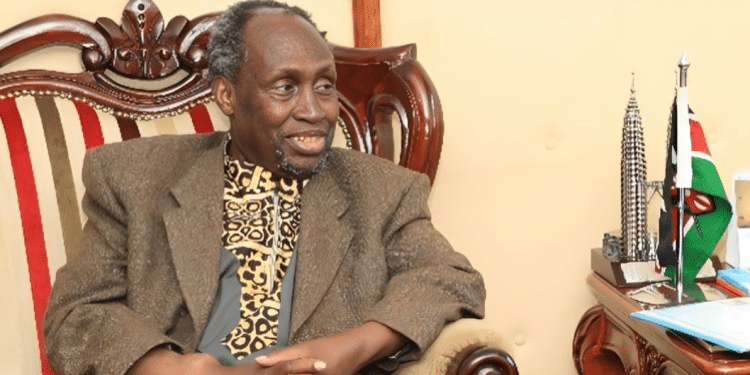In October 1977, Ngugi wa Thiong’o staged the play Ngaahika Ndeenda (I will marry when I want) in his native Kikuyu language at the Kamiriithu Educational and Cultural Center in Limuru.
The production featured a cast of local peasant farmers and tells the story of how former Home Guards, who had supported the British during the Mau Mau rebellion, were collaborating with foreign capitalists and prospering, while those who fought for independence remained in poverty.
The play critiques neo-colonialism, class inequality, land injustice, and the exploitation of workers in post-independence Kenya.
Set in a rural village, it follows Kĩgũũnda, a poor farmer, as he resists pressure from wealthy landowners and church leaders to give up his land and abandon traditional values. It portrays how religion, capitalism, and politics are used to control the poor while calling for resistance, awareness, and self-empowerment.
Ngugi wa Thiong’o Arrested
Shortly after its launch, the play gained widespread attention throughout the country, attracting the notice of President Jomo Kenyatta’s administration.
Initially performed with a permit, on November 27, 1977, the then Central Provincial Commissioner, Simeon Nyachae, withdrew the permit, halting further performances. Kenyatta’s government later banned the play.
Also Read: Today in History: Artur Brothers Deported from Kenya Three Months After Raiding Standard Group
On December 29, 1977, then-Vice President Daniel Arap Moi signed a detention order for Ngugi’s arrest. He was arrested at his home in Limuru during the early hours of December 31.
In his writing, A Writer’s Prison Diary (1981), Ngugi recounts how police officers arrived at his residence around 3 a.m., conducted a thorough search of his home, and confiscated copies of his books and manuscripts without a warrant. Among the confiscated items were copies of Ngaahika Ndeenda and works by Karl Marx, Friedrich Engels, and Vladimir Lenin, which were regarded as subversive.
Without presenting formal charges at the time, Ngugi was taken into custody under the Public Security Act, which permitted detention without trial.
Renowned Kenyan Novelist Passes Away
He was transported to Kamiti Maximum Security Prison in Nairobi, where he was held incommunicado for nearly a year, until his release on December 12, 1978, following international pressure from organizations like Amnesty International.
The Kamirithu Community Theatre, where the play was staged, was subsequently destroyed by the government, and the community center’s chairman, Ngigi Mwaura, received orders to cease all performances. After his release, Ngũgĩ faced harassment, and fearing for his safety, he went into self-imposed exile in 1982.
Also Read: Today in History: Activists Who Wrote a Letter to ICC Gunned Down Along State House Road
He lived in London, UK, until 1989 when he moved to the United States, where he resided for nearly four decades.
Ngugi’s play I Will Marry When I Want made a triumphant return to the stage in 2022, after being banned for over 30 years. The play was performed at the Kenya National Theatre from May 12 to May 29, 2022, marking the first time it was staged in both Kikuyu and English.
Ngũgĩ wa Thiong’o passed away on May 28, 2025, at the age of 87 in Atlanta, USA. His death was announced by his daughter, Wanjiku wa Ngũgĩ.
Follow our WhatsApp Channel and X Account for real-time news updates.




![[Live Blog] Raila’s Body Arrives At Mamboleo Grounds A Photo Of Aircraft Carrying The Body Of Raila Landing At Mamboleo Grounds.](https://thekenyatimescdn-ese7d3e7ghdnbfa9.z01.azurefd.net/prodimages/uploads/2025/10/a-photo-of-aircraft-carrying-the-body-of-raila-landing-at-mamboleo-grounds.-photocitizen-360x180.png)



































































![Kipruto Arap Kirwa'S Recalls His Interactions With Raila Odinga In Kibaki'S Cabinet [Video] Kirwa Has Defended Mwangaza Saying He Can Vote For Her.](https://thekenyatimescdn-ese7d3e7ghdnbfa9.z01.azurefd.net/prodimages/uploads/2023/10/Former-UDA-Vice-Chairman-Kipruto-Arap-Kirwa.jpg)


